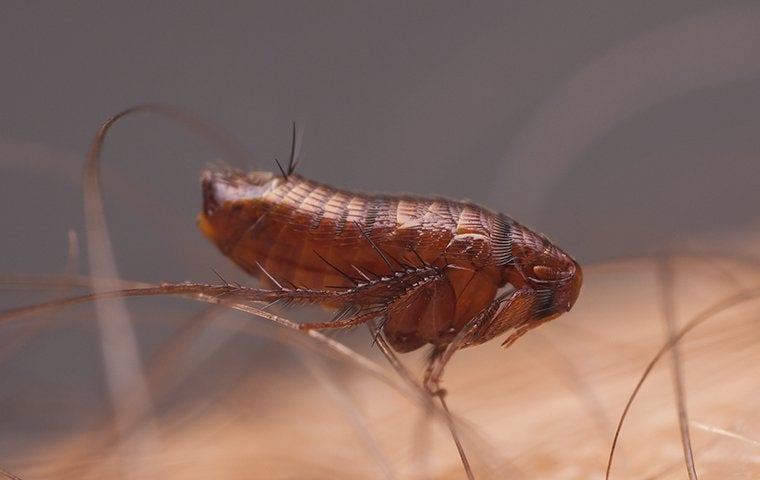The heat of the Floridian summer won’t relent, and we’re all trying to take cover in the shade. While we’re trying to stay cool, there might be something lurking in those shady nooks.
Fleas are known to be on the hunt in seasons of warm weather, and they are prone to hiding in the shade. Because they’re always ready to jump at you from a foot away, Jacksonville pest control specialists know this is the time to be on your guard.
Why Fleas Bite
Flea bites on humans are quite common and a dead giveaway that you might have a flea problem. Of the 300 species, the ones that trouble our cats and dogs aren’t likely to live on human skin, but they are incredibly likely to bite us.
The things that attract fleas to bite us are:
- Body heat
- Breathing and the release of CO2
- Movement
- Vibrations
Fleas bite us because they are parasites that feed on blood. After feeding, the females are able to lay their eggs. These flea eggs then eat the blood from the adult flea feces to help grow into the next generation.
Flea Bites Can Be Harmful
Flea bites can be irritating or, in some cases, highly dangerous.
When a flea bites us, it uses its tiny needle proboscis of a mouth to pierce our blood vessels. This allows a flea to suck up the nutrients flowing in our blood but also injects its saliva.
The vast majority of people have a flea allergy. The actual irritation is caused by the body’s responsive release of histamine to fight the flea saliva allergen. It also can cause rings to form around the flea bite marks. Itchiness will hopefully be the worst of it.
However, fleas can also carry diseases that will transmit into the bloodstream.
Diseases that fleas can carry include plague, endemic murine typhus, cat scratch disease, and other parasites like tapeworms.
Symptoms of these more serious infections include:
- Headaches
- Abdominal pain
- General discomfort
- Nausea and vomiting
- Fever
- Blisters
If you’re experiencing extremes of any of these symptoms, you might need to see a healthcare specialist. While it is not too common to contract serious infections from fleas, a growing infestation means growing chances of threats.
Flea Infestations Are Treatable
If you have an infestation, the best way to get rid of fleas is to be persistent with scouting, cleaning, and pet care.
Take these steps to ensure you’re battling them sufficiently:
- Find them.
- Clear your home of pets and keep children out of the way.
- Check pets’ ears, neck, back, and belly.
- Bathe pets thoroughly with soap.
- Pick up stray items and clean them.
- Throw away pet bedding or wash them once a week for a month.
- Steam clean surfaces.
- Vacuum (best with a bar-beater).
- Use pesticides. (We at Trad’s would like to remind you that this is best if done by professionals.)
To find them, look on your pets and in places where your pets sleep the most. Also, look where there is little foot traffic and less sunshine.
These pests will dig into your carpet, so vacuuming should be thorough. Move furniture that isn’t flush against other surfaces, and don’t forget to treat cabinets, cushions, upholstery, cracks in the floor, and beds.
Vacuuming also stimulates the larvae to emerge from their cocoon early, making them vulnerable to pesticides. Flea eggs on bedsheets and other locations will be easy to spot, thanks to the flea feces left behind. This will look like grainy specks of dark pepper.
Fleas can also infest your yard, so be sure to get more sunlit areas by removing debris. You can walk through wearing white socks to easily see if any of the black-speck-looking critters are jumping out and clinging to you.
Treatment isn’t a one-off occurrence. You’ll have to do a lot of repetitious checking, clearing, and cleaning. We highly advise contacting professionals like us to help fight larger infestations.
How To Avoid Future Flea Infestations
These blood-suckers can get out of hand quickly. We encourage you to be proactive about staving off infestations by:
- Being more aware during warm weather and shaded areas.
- Being aware of where to look on your pet.
- Keeping a clean, vacuumed, sunlit environment.
- Acting fast.
A flea comb can be an excellent tool to inspect the skin below the fur on pets. By checking and cleaning regularly, you’ll stop infestations before they get going.
Trad’s, our family-run pest control company, has been providing peace of mind and friendly service here in Jacksonville for over fifty years. Reach out if you need swift, effective help with eliminating any and all pests.

